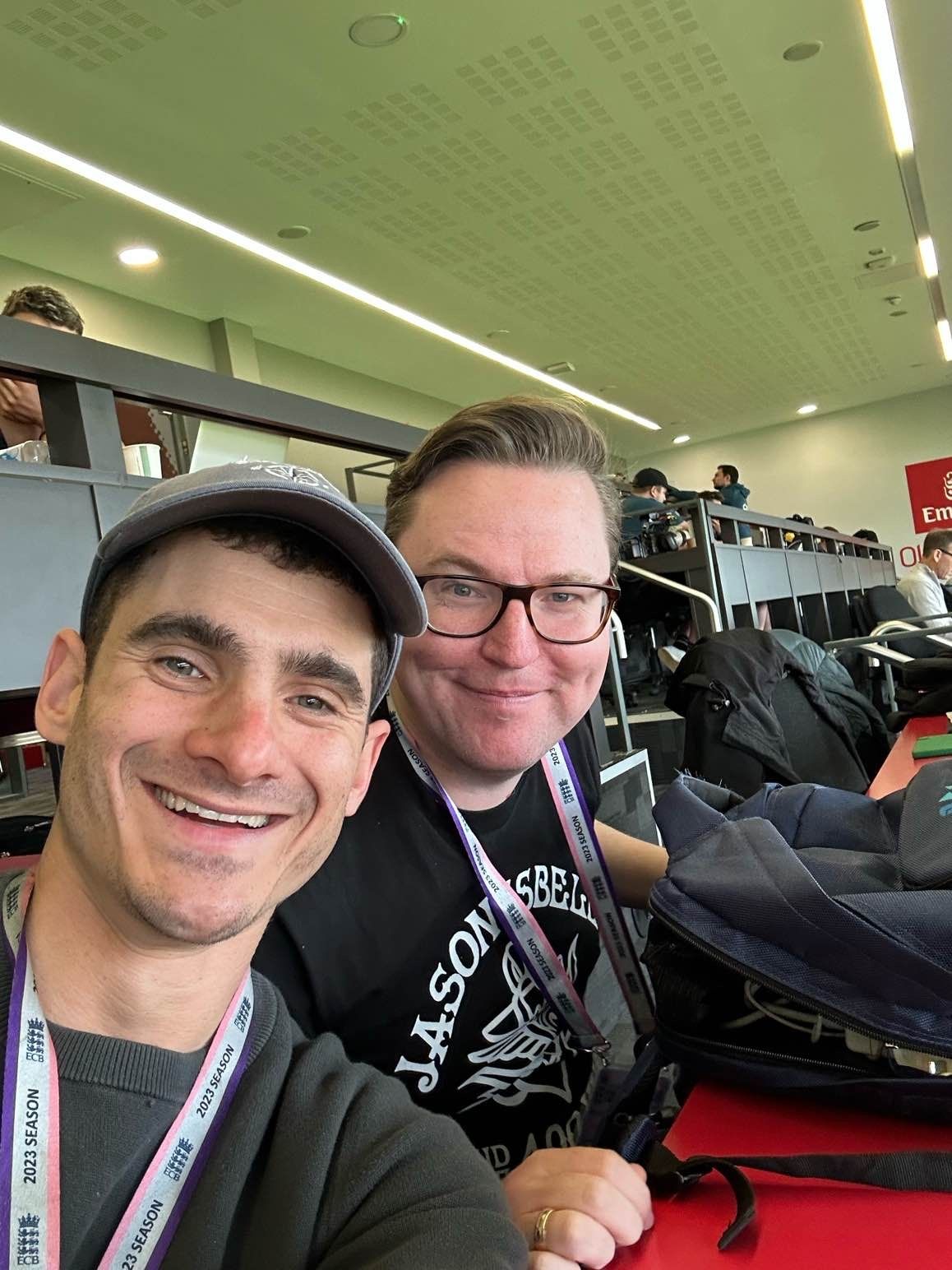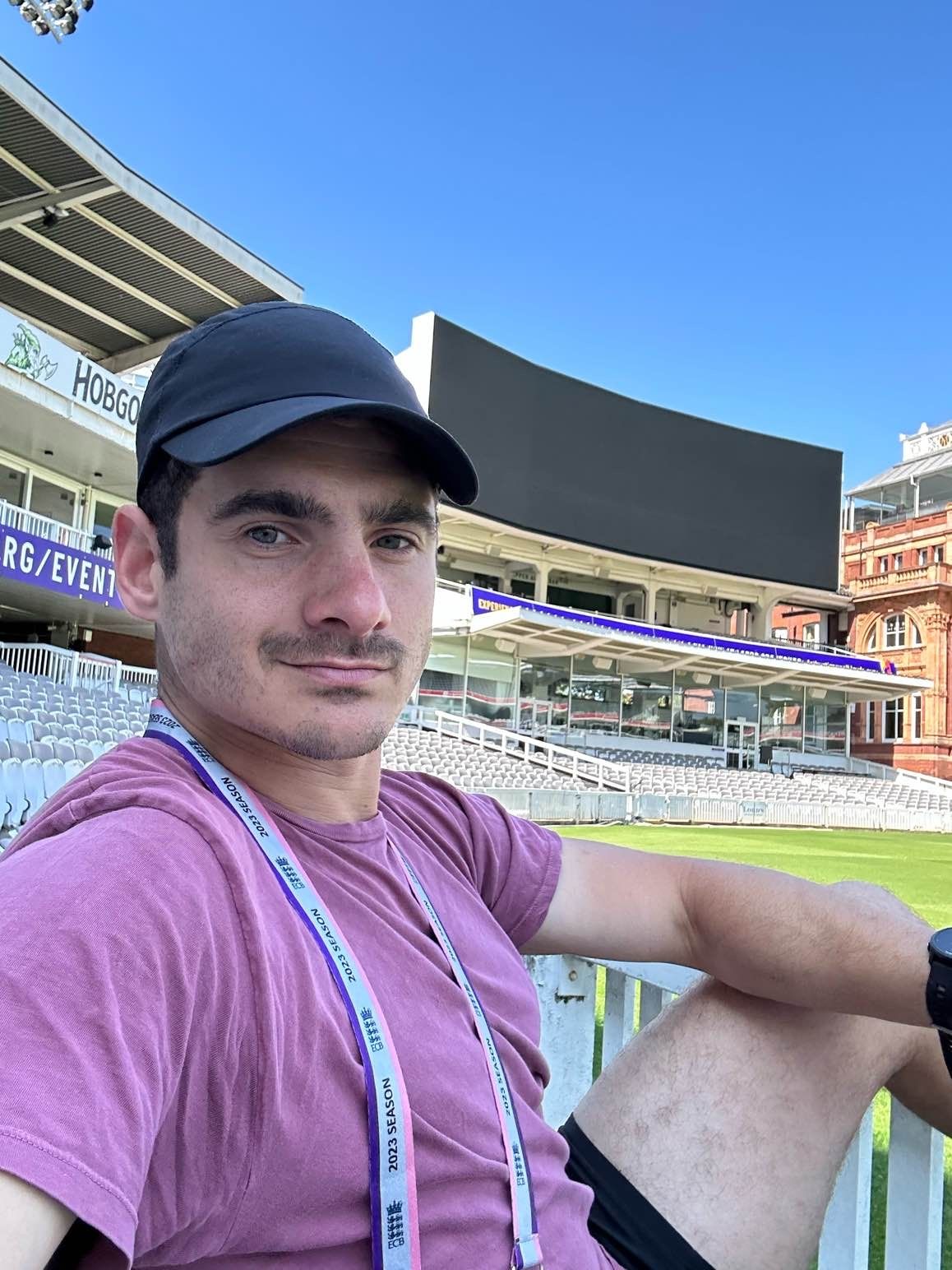✍️ What makes this sports journalist an elite operator?
How Daniel Cherny reported on the 2023 Ashes Series for Code Sports
Hey, I’m Reuben and welcome to my weekly blog. Each week I dig into the goals, habits, routines, and strategies behind the Elite Operators in the sports industry. All so you can accelerate your career and make an impact in sport.

Meet Daniel Cherny, Sports Writer for Code Sports. Dan’s been covering sport for 13 years, but most recently, he reported for the Australian publication on the action from the 2023 Ashes Series between England and Australia in the UK. It was high drama, late nights, and months away from home. Conditions that take an elite operator to give a nation their cricket fix. Here’s how he does it.
Explain a bit about your career background and your current role.
It’s been a bit of a circuitous route to get to this point. I finished high school in 2008 and while I always had an interest in sport and media I didn’t necessarily think it was a viable career. The upshot was I ended up starting (and eventually finishing) a commerce/law degree. But I struggled my way through it and soon realised it wasn’t what I wanted to do long-term. So I started exploring various unpaid media opportunities on the side including local radio and starting my own footy website with friends. One thing led to another and in early 2014 I was extremely fortunate to be offered a job at The Age. I spent almost eight years there before joining CODE Sports ahead of its launch in late 2021. I currently work as a sports writer primarily covering cricket and the AFL.
When you were preparing to cover the Ashes in England, what did your preparation look like?
I knew I would likely be covering the tour from about three months out so started preparing then. In the early stages it is logistical, teeing up accreditation and ensuring everything is in order with flights and accommodation. I am fortunate to have excellent support in that regard. More than anything beforehand it is about trying to be prepared for the early stages of the tour. Organising some set piece interviews and deep dives to ensure you are on the front foot from the outset. Cricket Australia held a training camp in Brisbane in mid-May which I went to and got a handful of interviews to roll out over the next few weeks. Once the cricket begins the stories more readily take care of themselves as the talking points are clearer. I worked in the office but also a bit at home and organised coffees with some cricket contacts to find out any pre-tour nuggets that might be helpful down the track.

In your reporting of the Ashes, are there any particular themes or types of stories you can predict and prepare for? If so what are the typical types of articles that make up 80% of your writing?
As the touring journalist you are required to be versatile and write different styles of pieces. The biggest mix is between news and analysis. You might also chip in with some breaking paragraphs or observations for a live blog.
What deadlines do you work to when reporting from the UK to an Australian audience? Do you have any hacks that speed up your writing process?
There was a pretty clear delineation between match days and non-match days. During match days I would be filing a lunch update for a late print edition, and sometimes also filing shortly after lunch for an even later edition. I would then turn my attention to the Australian morning, generally writing three pieces of varying length and content for those waking up back home. When it comes to filing quickly on deadline there is little substitute for practice and experience. But ultimately it pays to be organised and to have body paragraphs ready to go which don’t need to be significantly adjusted whatever the lead of the story may be.

Explain your use of Twitter. Is there any strategy behind your content? What kind of posts do you share and why? Does this change during match days and non-match days?
I’m probably a bit looser on Twitter (or X?) than most. I will generally share most of my pieces, and pressingly tweet them out when there is breaking news or I have an exclusive as I believe it is important to leave a digital footprint when you have a good story. I like tweeting stats too, or some funny observations or bad puns. Largely I will share any breaking news with a link back to a story of mine or our live blog to direct traffic to CODE as ultimately I work for them, not Twitter.
What do you do to ensure you stay healthy during a long tour?
You have to be flexible as it is not a typical work environment and hours can be a touch unpredictable. But generally, I tried to exercise most days, either by purchasing a short-term pass to a nearby gym or at the very least going on a walk. Otherwise trying to eat reasonably healthily and perhaps most importantly ensuring I got enough sleep, which is probably the biggest challenge given after a long day of work it is tempting to have a late night out with other journos at the pub. It’s just about choosing some night to head in early to ensure you are at your best for the job.
On tour, if you had complete control of your day on a non-match day, how would you structure it?
It depends on whether the Australian team is training or not, as being at training, where you effectively are serving as a handful of eyes for millions of fans back home is an important responsibility. I prefer when the team trains in the morning as otherwise the days can really drag, and they are long enough on match days. If you aren’t travelling between cities and the team isn’t training you have a lot more freedom to work a bit more at your own pace. I’m not naturally a morning person but it’s nice to knock over your work by mid-afternoon on quiet days given the hours accumulate during matches.
In the last 5 years, what lesson that you’ve learnt or change you’ve made to your writing has made the most tangible improvement to the quality of your articles?
You’d probably be better served asking my editors. But I think there’s a lot to be said for not overdoing stories with quotes. Pick the quotes that are important and really enhance the story, but often the same thing can be said without a direct quote. Trivia and colourful analogies also enhance feature and colour writing significantly.

How do you balance reporting on sport as it happens, with longer articles that may take months to compile? How many ‘longer’ articles that require time to produce will you have in the works at any one time?
It’s a great question and an eternal balance, especially if you are working on daily deadlines as I have done a lot during my career. At any given time I have a long list (perhaps in triple figures) of ideas and leads to explore, many of which will likely never materialise. But it’s important to chip away at these ideas when you have time as I think the variety keeps you fresh and motivated. Articles have various different phases of their life. From mere germs of ideas to pieces where you have done a few interviews and need to bring them together. It’s hard to pinpoint how many ‘longer’ pieces I have in the works at any given time as it is a spectrum.
If you had to put the success of your journalism career down to 1 or 2 things you’ve done consistently for a long time, what would you say those are?
I’ve got some weaknesses: I’m not overly confrontational and wish at times I was harder-nosed. But I think the things that have served me best are initiative and relationship-building. You need to be willing to at least explore ideas and get in touch with people otherwise you’ll never find out anything. Then it is about building relationships with a wide circle of contacts and ensuring that you aren’t only calling people when you need something.
And if you want help with something work-related, let me know! We can cover it in a future blog.
Thanks for reading,
Reuben
